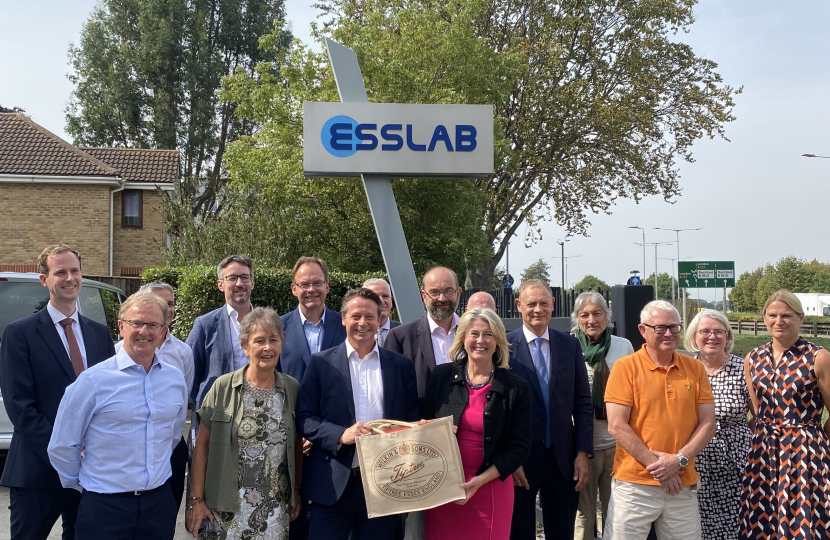
Local MPs Anna Firth (Southend West) and Sir James Duddridge (Rochford and Southend East) welcomed Minister for International Trade Nigel Huddleston, to Essex Scientific Laboratory Supplies (ESSLAB) for a business summit on international trade last Friday.
The event, organised by Anna Firth and the Essex Chamber of Commerce, was attended by sixteen different South East businesses and demonstrated the huge contributions to the UK economy made by the Eastern region.
As Firth highlighted the Thames Estuary, backed by the Government, is the UK’s number one growth area, with the potential to create 1.3 million jobs and add £190 billion to the nation’s economy by 2050.
Huddleston emphasised the open nature of the discussion, and stated that Essex industry was in a ‘very special’ position when it came to industry development. He was keen to dissect key aspects of policy and international trade agreements affecting local businesses from all over Essex. A high level discussion followed spanning a post-Brexit trade market, the import/export balance in the UK, international trading permits, as well as the Windsor Framework and health and safety import standards, with particular focus on the food and drink industry.
Businesses such as Tiptree and Bibby Financial Services reinforced the extensive benefits of governmental support over COVID and the energy crisis. Last year, one third of business bills were covered by government support.
Cliff Marshall, the CEO of Southend-based ESSLAB, sees 35% of its turnover coming from overseas. He expressed the importance of ongoing sustained governmental support to allow Southend to capitalise on its huge industrial output, proposing a similar model of regional development to the Northern Powerhouse Programme. ESSLAB, which provides high-quality Certified Reference Materials, Laboratory Instruments and Consumables to meet the needs of laboratories worldwide, suggested that business programmes for strengthening the local area could be implemented in order to ensure that businesses could continue to deliver overseas, with support from both local and international government. Other industry heavyweights, such as Simarco International’s CEO Simon Reed, also identified the need for retention of business in the UK and limiting the distribution of goods into warehouses in Europe, such as in Holland or France in order to retain employment and maximise productivity.
The emphasis on collaborative working relationships between businesses, local bodies and government on a local and national level was reiterated by Huddleston and Firth throughout the discussion. Both emphasised the importance of businesses contacting them with specific concerns in order to allow them to lobby the relevant bodies most effectively. Huddleston also highlighted the existence Export Support Services and the Government’s Trade Advisors, which deliver targeted support for businesses with international interests.
Mark Faraway, Senior Commercial Manager of Port of Tilbury London, identified the importance of reducing the backlog of permit applications. The largest multi-modal port in the Southeast, Faraway identified a poorly functioning system that is taking a year for each individual permit request to be assigned a caseworker, with permit applications taking up to two years from then to be successful, which is limiting productivity.
All participants highlighted the international economic picture, in which the UK is the second largest exporter of services in the world and the fifth of goods. Roy Gandy, owner of Southend-based Rega Research Ltd, emphasised the importance of utilising a post-Brexit landscape to secure distribution contracts beyond Europe, stating that securing travel visas for potential distributors form Ukraine, Moldova and India was vital as the UK looks to negotiate more Trade Corporation Agreements (TCAs) from beyond the border.
Firth, who has dedicated significant energy to promoting world-leading Southend businesses such as Olympus KeyMed, Ipeco, Tapp’d and Borough Plating, emphasised how pleased she was with the trade summit, and suggested that the conversation continue, perhaps in a Westminster setting, in order to continue to capitalise on the productivity and growth of the Essex region.

